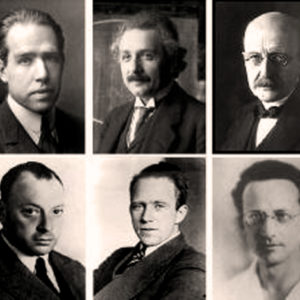
the champions of quantum weirdness
In our lifetimes, our society is going through an update of how we think about the nature of things. It began almost one hundred years ago. Neils Bohr helped us discover that the chair you’re sitting on is really empty space and energy. Einstein told us that reality changes relative to where you’re standing when you experience it. Heisenberg told us that the world is an unknowable place. Not only can’t you know what’s really going on at the most basic level of things, if you try and find out, you change it by just looking.
Crazy stuff!
Ours has become a new world. A new reality. A new universe.
And what are we doing? The same thing we did last time. We’re updating our worlds to match the new physics.

our truth is true! yours is not! let’s bomb each other.
During the Enlightenment era, certitude was the gold standard. Truth came without complications. “A” was true, and therefore “not-A” was not true. Consequently, we sought one-and-true principles to live by. Democracy was true, and therefore Socialism was not true (we fought a Cold War over that one). Capitalism was true, so Bolshevism was not true. Ours was a quest to find the laws by which human societies, families, governments, and economies could best run. We found them, we lived them, and it went great (most of the time).

quantum weirdness: slit interference
But when we discovered what the universe is really like – at a sub-atomic level, our basic reality got an overhaul. Reality isn’t precise at all. It’s not a mechanical, one-and-true-principle affair at all. Light is two mutually exclusive things; wave and particle (more). Electrons can be two places at one time (more). Separated particles aren’t really separated at all. They dance with each other across light years (more). Reality, it turns out, is random, chaotic, uncertain, connected, and illusory. We think the table is solid; we act like it’s solid. But it’s not. It’s empty space and energy. The very idea of “solid” is an illusion. Time feels like a constant, but it’s not. Like the rest of reality, it’s a transient, ephemeral construct.
When our physics changed, our view of reality changed. We relate to the table as though it’s solid (we put stuff on it), but our minds adjust to living in a universe where reason and our five senses are deceiving us. Ours becomes a universe of illusion. And if the table is an illusion, maybe you are an illusion. Maybe I am! Maybe democracy, capitalism, and all our previously indisputable truths are illusion too!
 As this burst of scientific updating has made its way into popular understanding, it has begun to undercut our idea that there are universal truths by which to live our lives. It has undercut our confidence in the absolute nature of anything.
As this burst of scientific updating has made its way into popular understanding, it has begun to undercut our idea that there are universal truths by which to live our lives. It has undercut our confidence in the absolute nature of anything.If the table isn’t absolute… maybe the Christian idea that women can’t speak in church isn’t either.
And this is the universe young people live in.
But it’s not a universe the Christian Church is navigating very well.